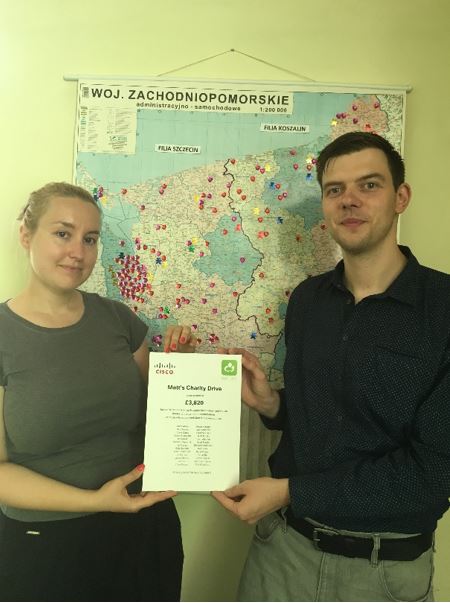
This is the second blog entry on West Pomeranian Hospice for Children and Adults, where I interview its President, Kinga Krzywicka, to help us better understand the role that the Hospice fulfils, and how one can get involved.
For more background on how we at Cisco supported (and hope to continue to support) the Hospice, please check the previous entry.
Matt: Hi Kinga, good to have you with us. What can you tell us about the Hospice, and about how it works?
Kinga: When we look at hospices, we should acknowledge St. Christopher’s Hospice, established in London by Dame Cicely Saunders in 1967. This first modern day hospice laid the foundations for contemporary hospice care.
As for our Hospice, we focus on home care, being of the mind that it is best for children to stay at home, so as not to split the family apart. We started working with children in March 2006 in Szczecin, Poland – and expanded to Koszalin in 2009. Now we work predominantly across the West Pomeranian Voivodship.
Matt: You have over 100 patients in your care now. This must have been a difficult journey.
Kinga: Indeed. It was a niche area at first. Doctors hesitated to direct severely ill children to a hospice as it was perceived as being simply a place to die in. However, word-of-mouth travelled fast, and we garnered support for the Hospice, which soon grew from 12 to 50 child patients, and now that we also support adults, 100 patients in total (over 180 if we include enteral nutrition patients).
Matt: What about yourself? How long have you been working here?
Kinga: I started in March 2007, almost from the start.
Matt: Throughout your years with the Hospice, what was the most memorable story?
Kinga: There was a boy named Kacper, afflicted with mucoviscidosis, who was an avid sports fan – basketball, volleyball, and much more. He dreamt of taking part in sports events, so the Hospice organised for him to participate in a volleyball match played by the Polish women’s national team – witnessing it right there from the bench, next to the trainer and the players. Kacper wanted to do this without his oxygen concentrator, putting on a brave face in front of everyone. The match lasted for whole 5 sets – the longest a volleyball match can – but despite the strenuous circumstances, Kacper was delighted it lasted that long as he felt as if he were part of the team.
(Matt’s note: I will always remember the story of a terminally ill little girl who always dreamt of being a princess, for whom the Hospice organised a bespoke day out in a theme park so that she could really feel like one.)
Matt: Who does the Hospice work with, externally?
Kinga: As it happens, we organise a high number of sports-themed events. Amateur volleyball players, professional volleyball players, runners, ski-jumpers, boxers, martial artists… including some of Poland’s Olympic champions, are all keen to support us.
While not everyone knows about our work, those who have received our help don’t forget and help us spread the message and obtain necessary funding to fulfil our role in the public space here.
Matt: Aside from donations being a crucial part of the Hospice’s finances, what other ways are there to contribute to your work?
Kinga: By being a volunteer – as you know, having been one. The support of volunteers is crucial for the families of patients under our care, and in some cases, it is absolutely necessary to help them function properly.
We also appeal to companies, institutions, and individuals for their support in providing us with items that are required in hospice care – such as diapers, wound dressings, or care products – for those families who wouldn’t otherwise be able to afford them, as the Hospice cannot provide these by itself.
Matt: On a final note, what would you say to those wanting to get involved with the Hospice?
Kinga: There are many possibilities to get involved, and everyone can find their own niche. From my own example, at first I refused the offer to work in the Hospice, fearing that daily contact with incurably and terminally ill children would be too much for me. To be sure, you can work here without direct contact with the patients – but in the end, you know who you are here for, and after eleven years of working here I know how important the Hospice is to those whose lives it touches – and anyone willing can fit in somewhere and help us in a way that works for them.
Matt: Brilliant, thank you for the interview.
Kinga: Thank you.

Kinga and Matt against the backdrop of a map marking the locations of the Hospice’s patients.
If you’d like to know more about West Pomeranian Hospice for Children and Adults, please be sure to visit their website at:
www.zhdd.pl (Polish only)
Merry Christmas and a Happy New Year!
Matt